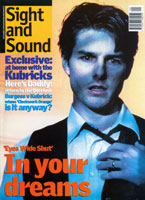Primary navigation

UK/Italy 1998
Reviewed by Xan Brooks
Our synopses give away the plot in full, including surprise twists.
Mum, Dad and their teenaged children Tom and Jessie relocate from their native London to a cottage on the coast of Devon. Mum gives birth to a baby girl, Alice. Returning home one day, Tom looks through the window and sees Jessie taking a bath with Dad. Tom questions Jessie. Despite her assurances that the bath was innocent, Tom's suspicions are aroused. He hunts through Jessie's art-college portfolio and finds a photograph of his sister naked with Dad. Tom tracks Jessie to a concrete shelter on the cliff top. There he videotapes her unwillingly submitting to sex with Dad. Sickened, he tosses the camera into the sea. Again, Tom confronts Jessie. She invites him to punish her by holding a cigarette lighter to her bare breast. Dad travels up to London on business and takes Tom and Jessie along with him. There, Jessie escorts Tom to meet her college friend Carol who attempts to seduce him.
Back in Devon, baby Alice falls ill and Mum stays with her at the hospital. During a visit, Tom warns Mum about Dad. Returning home, he finds Dad has already spoken to Mum on the phone and is panicked and angry. Even when Jessie confirms Tom's accusations, Dad denies he has done anything wrong. Tom stabs Dad and leaves him for dead. He and Jessie hide out in the shelter.
There is a key shot near the start of The War Zone where the camera dollies in towards the hunched form of Ray Winstone, crawls up close behind him as he chats into the telephone and scrutinises the back of his meaty neck. It is a Peeping Tom moment: the viewer cast simultaneously in the role of voyeur and potential threat. It both mimics the movements of the tale's adolescent onlooker and foreshadows his eventual knife-thrust denouement. The whole film seems to reside in that lone, lingering point in time. Adapted from the 1989 novel by Alexander Stuart, The War Zone can perhaps best be read as a kind of nightmare of adolescence. Fifteen-year-old Tom is at once defined by his close-knit family and alienated from it. His fledgling independence has repositioned him as an outsider looking in but, as yet, he lacks the experience to interpret confidently what he sees.
So while Tom effectively serves as our guide through The War Zone, his vision is dotted with blind spots. Significantly the audience is never allowed to witness the sight which first triggers his suspicions of incest (Dad and Jessie bathing), suggesting that the boy's initial conclusions could be misguided, coloured by his own charged and complex feelings for his sister. Even when the mystery is cleared away, the film's landscape stays foggy, its inhabitants oblique and unreadable. We are never certain, for example, if Jessie's London pal is also her lesbian lover, or if Mum is entirely unaware of Dad's doings. The film's Play School-style house is home to all manner of secrets. In The War Zone, what we aren't shown is often as important as what we are.
In making his directorial debut, Tim Roth has cited Alan Clarke as a primary influence. But unlike fellow Clarke graduate Gary Oldman (whose Nil by Mouth bore obvious Clarke hallmarks), Roth proves surprisingly free of the great man's coarse-grained, edgy style. Instead, his film feels more indebted to Russian or European art-house (Roth claims Tarkovsky and Bergman as other influences). Because despite its hothouse environment, there is a chill beauty to The War Zone. Its narrative is framed in elegant long shots and nudged along by spartan editing. Its characters - frequently naked - are posed like figures in a Lucien Freud canvas; all purplish breasts and dangling cock and balls.
Like Andrew Birkin's similarly themed 1993 The Cement Garden, The War Zone trades in a kind of trancey naturalism. Throughout it all Roth keeps the acting down-played, the dialogue murmurous, the atmosphere an ongoing ennui. Fittingly the cast come together as a study in neutrals. Newcomer Lara Belmont provides a magnificently restrained and unsettling performance as Jessie. Tilda Swinton makes a still and inscrutable Mum, while Ray Winstone's past pedigree in films such as Nil by Mouth ensures that his Dad fairly crackles with the implied threat of violence.
Only Freddie Cunliffe hits a false note at times in the taxing central role. His endless thousand-yard stare finally grows overdone. In the film's dying minutes you start to spot the mechanics behind his performance, and those behind The War Zone as a whole. Because what Roth has done is to garnish a fairly stock domestic drama (seemingly nice dad; deep, dark secret) with so much artful window-dressing, rearranging familiar furnishings in a minimalist feng shui styling. This becomes apparent only at the finish, with an explosive dramatic showdown that is the scene with the least impact in the entire picture. It is the moment when The War Zone tumbles back to earth; as though Roth felt that his perfectly maintained stasis had to pay off somehow. If so, he needn't have worried, because The War Zone is at its best in its most seemingly idle moments. This is where the real drama resides, where the real spell is cast, where the picture comes alive, those quiet times before the storm.